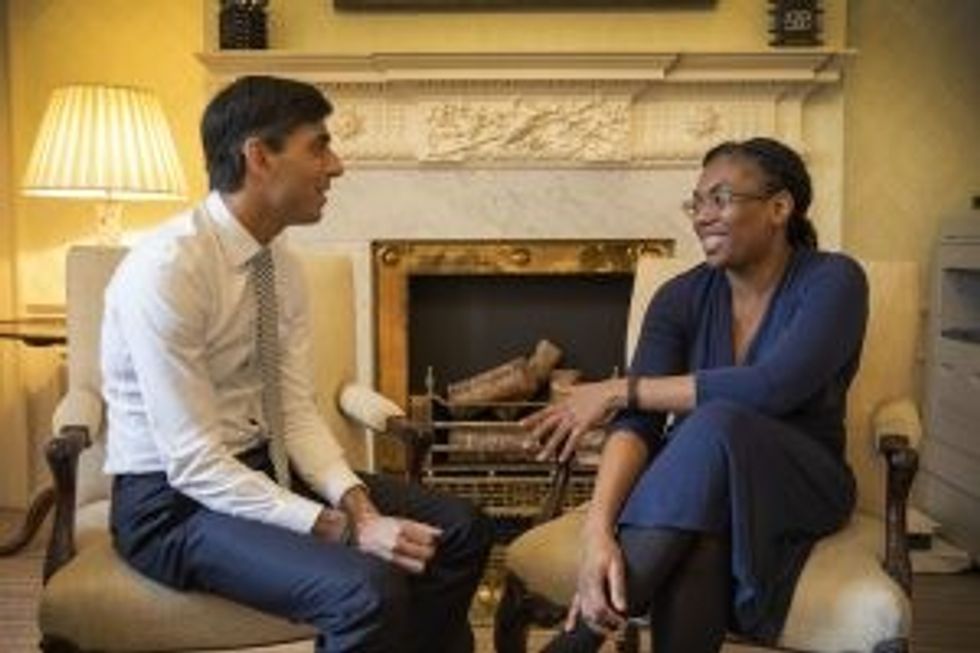INDIA is home to a vibrant faith-based civil society and among the world's most religiously diverse societies with a “proud history of religious tolerance”, the UK government said during a parliamentary debate.
Responding to the debate entitled ‘Christians and Religious Minorities: India' at Westminster Hall in the House of Commons complex in London on Thursday (24), UK minister of equalities Kemi Badenoch highlighted the “open and constructive dialogue” in place between India and the UK across all subject areas.

She reiterated that the UK-India relationship is “central” to Britain's foreign policy tilt towards the Indo-Pacific.
“India, like the UK, is a society with many different faith communities. It has a proud history of religious tolerance and is among the most religiously diverse societies in the world, with significant religious minority communities, including Christians and Muslims,” the minister said.
Also Read | Badenoch : New health inequalities report urges to do survival analysis among minorities
“We recognise that, in a country of 1.3 billion people, the situation for minorities varies, depending on the region and their social and economic status. It is up to the government of India to uphold those freedoms and rights, which are guaranteed by its strong democratic framework and legal mechanisms,” she said
The debate by backbench parliamentarians was called by Democratic Unionist Party (DUP) MP Jim Shannon, who is also chair of the All Party Parliamentary Group (APPG) for International Freedom of Religion or Belief.
“This debate looks to better things in India, ever mindful that we have a special relationship. It is my hope that things in life will get better,” said Shannon in his opening speech.
“Today's debate offers time to stop and reflect on the situation regarding freedom of religion or belief in India and the problems that persist today,” he said.
Conservative Party MPs Theresa Villiers and Bob Blackman were among the participants who spoke to highlight that freedom of religion is a fundamental right in India.
“Diversity, inclusion and respect for minority faiths have been core principles of the state of India since its inception,” said Villiers.
“In any country, there will be wrongdoers and extremists who commit crimes and incite hatred against minorities. What is important is to look at is how a state responds to such criminal and unacceptable activities,” she said.
Blackman spoke of how India's Constitution directly protects and safeguards religious minorities.
“Minority community status for Muslims, Sikhs, Christians, Parsis, Buddhists and Jains is not only protected by law, but they are encouraged to promote their individual identities. That is in the Constitution,” he said.
His fellow Tory MP, Fiona Bruce, however, pointed to “concerning reports of increasing discrimination and persecution” of religious minorities in some parts of the country.
“India is experiencing Islamophobia and Christianophobia, which in response can lead to Hinduphobia. This is all a far cry from the founding principles of India. It is a sad stain on modern India,” she said.
(PTI)


















 FILE PHOTO: A general view shows British Steel's Scunthorpe plant, in Scunthorpe, northern England, Britain, March 31, 2025. REUTERS/Dominic Lipinski
FILE PHOTO: A general view shows British Steel's Scunthorpe plant, in Scunthorpe, northern England, Britain, March 31, 2025. REUTERS/Dominic Lipinski
The FBU is planning to introduce new internal policies and wants the TUC to take action as well. (Representational image: iStock)
FBU chief raises concern over rise in racist online posts by union members
THE FIRE Brigades Union (FBU) and other trade unions are increasingly concerned about a rise in racist and bigoted online comments by their own members and officials, according to Steve Wright, the FBU’s new general secretary, speaking to the Guardian.
Wright said internal inquiries have revealed dozens of cases involving members using racist slurs or stereotypes, often aimed at asylum seekers.
He said similar issues were reported in other unions, prompting a joint campaign to counter false narratives around immigration and race promoted by far-right groups online.
“People with far-right views are becoming more brazen in what they do on social media, and I’ve witnessed it with my own union around disciplinary cases and the rhetoric of some of our own members,” Wright said to the newspaper.
He added, “Some of our members and sometimes our reps have openly made comments which are racist and bigoted. In my time in the fire service, that has gone up.”
The FBU is planning to introduce new internal policies and wants the TUC to take action as well. A formal statement addressing far-right narratives will be launched at the union’s annual conference in Blackpool next month.
Wright cited the influence of social media and figures like Donald Trump and Nigel Farage as factors contributing to these incidents. “It feels like an itch that we’ve got to scratch,” he said.
The FBU barred a former official last year for allegedly endorsing racist content on X, including posts from Britain First and Tommy Robinson.
Wright also warned that the union could strike if the government moves to cut frontline fire services.